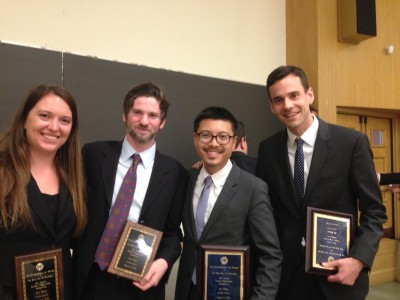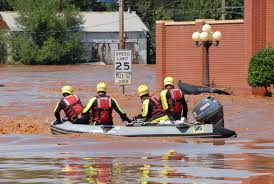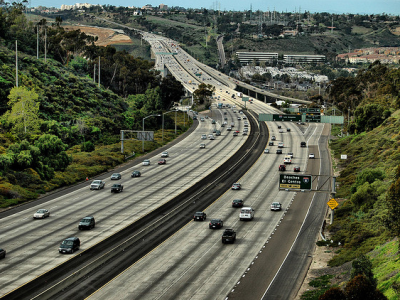Region: California
Biofuels and Food Prices
A recent economics paper suggests strongly that biofuels have raised food prices for the world’s poor.
Berkeley economist Brian Wright has a disquieting article in the Winter 2014 issues of the Journal of Economic Perspectives, which just crossed my desk. JEP is published by the American Economic Association and is a great resource for those of us who are interested in economics but aren’t professional economists. This article is a case in …
Continue reading “Biofuels and Food Prices”
CONTINUE READINGBerkeley and UCLA Law Students Take Top Spots at State Environmental Law Negotiations Competition
Students bargain for environmental protection, economic benefits at annual event
Last Friday, the California Bar Association held its 15th Annual Student Environmental Negotiations Competition, at UCLA School of Law. Negotiations competitions stand beside mock trial and moot court programs as means for students to gain experience with the kind of work they’ll be doing after law school. The CalBar competition is open to all California …
CONTINUE READINGSea Level Rises, Premiums Not So Much
Congress apparently just couldn’t resist restoring subsidies for coastal homeowners.
The President has now signed an important modification of the flood insurance program. The changes are hard to understand, in part because the bill changed an earlier 2013 law that itself amended the basic statute. So you have to work through the whole sequence to see what is going on. Before I go into more …
Continue reading “Sea Level Rises, Premiums Not So Much”
CONTINUE READINGThe Perils of Rail Transit and Democracy
How Decentralized Decision-Making Can Screw Up Rail Planning and Implementation
Americans seem to love democracy but hate many of the results. We want governmental power to be decentralized, whether it’s across three federal branches or with local control over sometimes regionally oriented land use decisions. But when the inevitable compromise that is required to get majority approval means a less-than-perfect result, from Obamacare to budget …
Continue reading “The Perils of Rail Transit and Democracy”
CONTINUE READINGCalifornia’s Path to 2050
Recent research shows that California can meet its 2050 climate goals at an affordable cost.
Could California make deep cuts in carbon by 2050 (80% below 1990 levels)? Are the economics feasible? Those are important questions for California, but they also have a lot to say about what’s feasible for the U.S. and other developing countries as a whole. Last December, UC Davis hosted a forum on the models that …
Continue reading “California’s Path to 2050”
CONTINUE READINGNew Environmental Law Rankings Place UCLA Law and Berkeley Law in Top 10
Rankings Reflect Colleagues’ Recognition
U.S. News and World Report, the most visible ranker of graduate programs, publishes its ranking of environmental law programs at U.S. law schools each spring, and the new list is out. Berkeley Law is ranked #3, and UCLA Law is ranked #10 – the first time we have cracked the Top 10. Along with Georgetown, …
Continue reading “New Environmental Law Rankings Place UCLA Law and Berkeley Law in Top 10”
CONTINUE READINGIn Memoriam: Joseph L. Sax, Gentleman, Scholar, Giant of Environmental Law
Visionary environmental advocate will be sorely missed, long remembered.
[Posted on behalf of all Legal Planet authors at Berkeley Law.] It is with great sadness that we share the news of the passing of Joseph L. Sax, James H. House and Hiram H. Hurd Professor of Environmental Regulation (Emeritus) at Berkeley Law. Joe was our hero, our teacher, our mentor, our colleague, our friend. …
Continue reading “In Memoriam: Joseph L. Sax, Gentleman, Scholar, Giant of Environmental Law”
CONTINUE READINGRailtown — A Different LA Story
Railtown tells the story of how rail transit came to
Ethan Elkind‘s new book, Railtown, tells the story of LA’s rail system. It’s a fascinating account of LA’s move away from an almost religious attachment to the automobile. The LA story has some important implications for other cities. It took several decades to get the current rail system built. There were many detours and delays …
Continue reading “Railtown — A Different LA Story”
CONTINUE READINGWould Californians be Better Off with a Fuel Tax instead of Cap-and-Trade?
Steinberg’s surprising proposal for California climate regulation
Climate regulation drama! Sen. Darrell Steinberg is floating a proposal that would change California law to take transportation fuels out of the cap-and-trade program, and to enact a new fuels tax instead. As background, distributors of those fuels are slated to join the cap-and-trade program in 2015, meaning they would need allowances to cover their …
Continue reading “Would Californians be Better Off with a Fuel Tax instead of Cap-and-Trade?”
CONTINUE READINGBerkeley Law Amicus Brief Highlights Benefits of Transit-Oriented Development
Smart growth alternatives would help end the vicious cycle of highway expansion and housing sprawl in San Diego region
Berkeley Law’s Center for Law, Energy & the Environment (CLEE) filed an amicus brief last week in a California Court of Appeal case with far-reaching implications for development, transportation, and California’s climate goals. The case, Cleveland National Forest Foundation v. San Diego Association of Governments (SANDAG), challenges the State’s first Regional Transportation Plan/Sustainable Communities Strategy …
Continue reading “Berkeley Law Amicus Brief Highlights Benefits of Transit-Oriented Development”
CONTINUE READING












